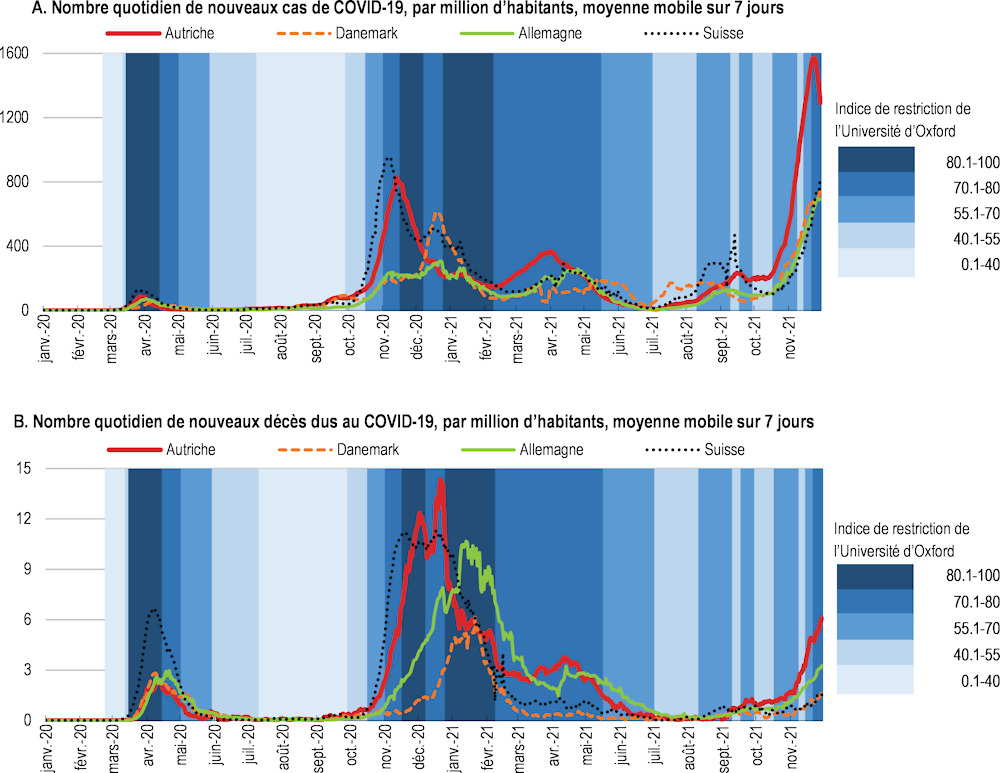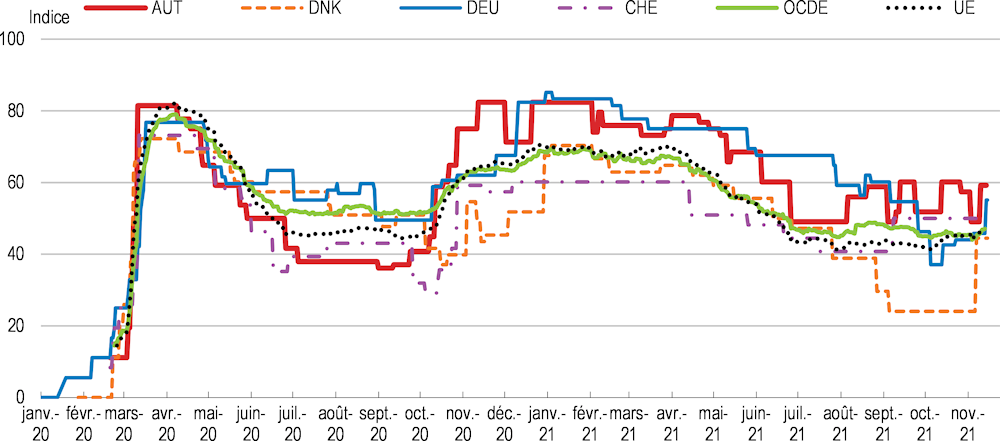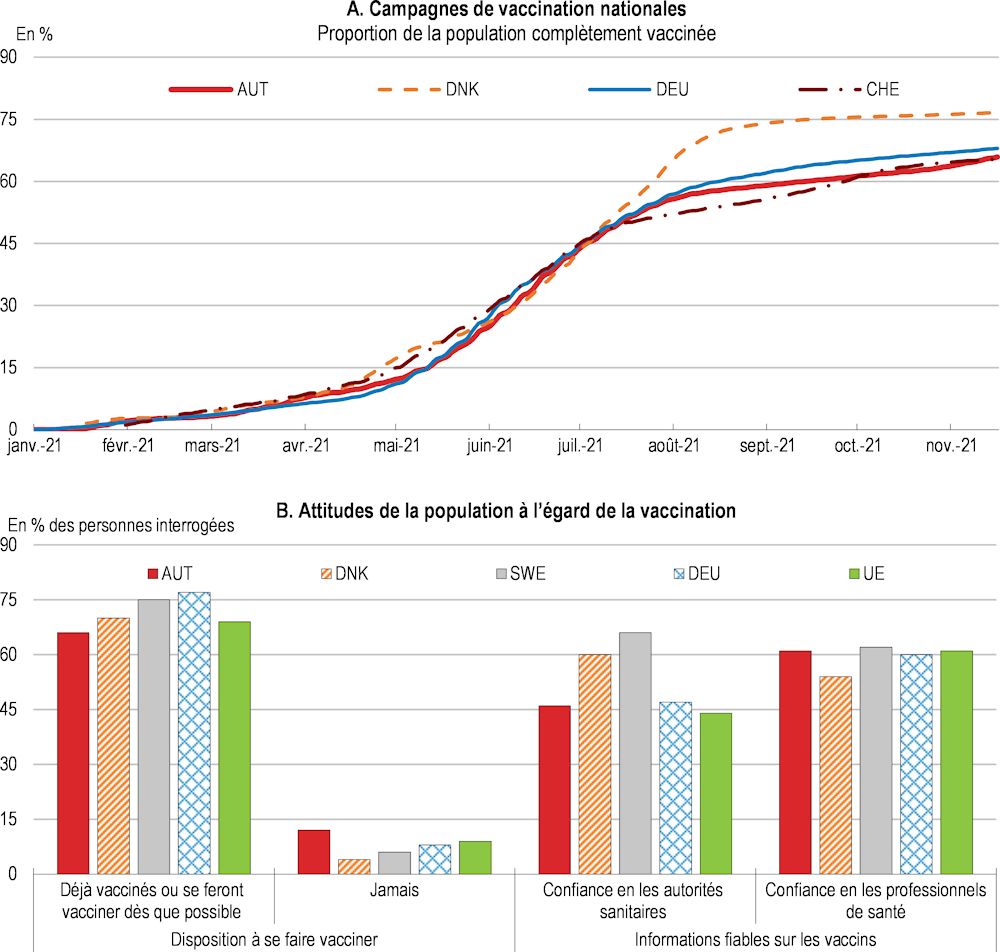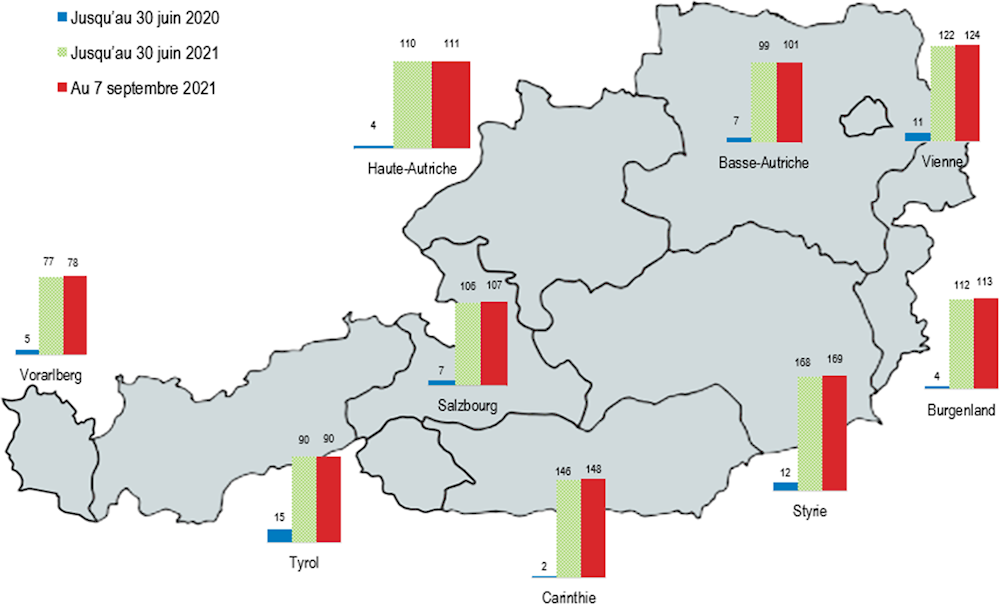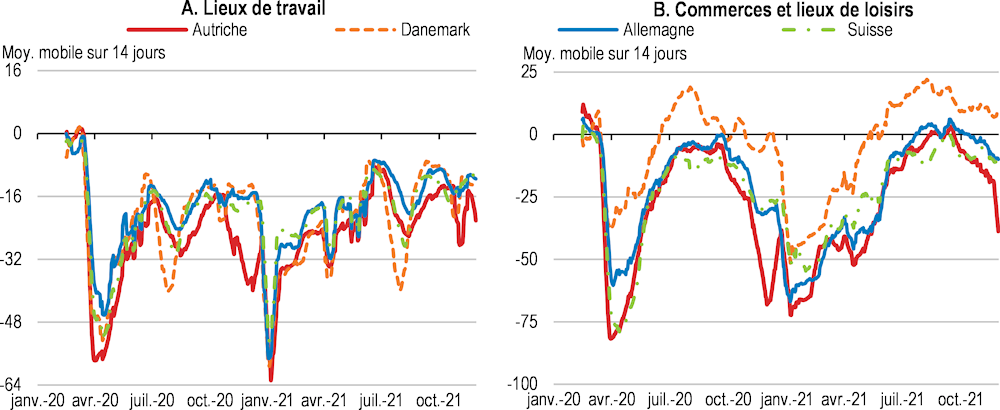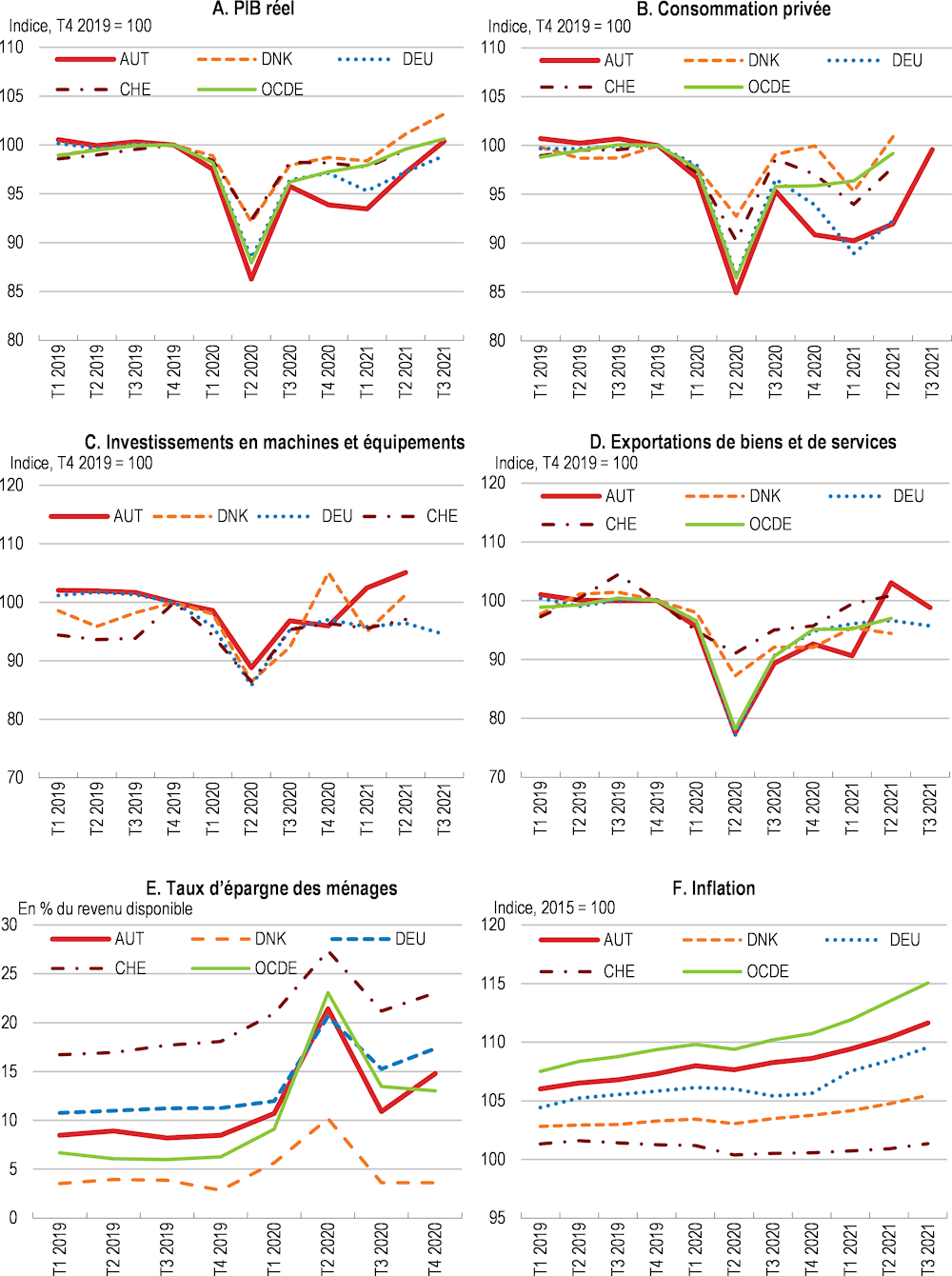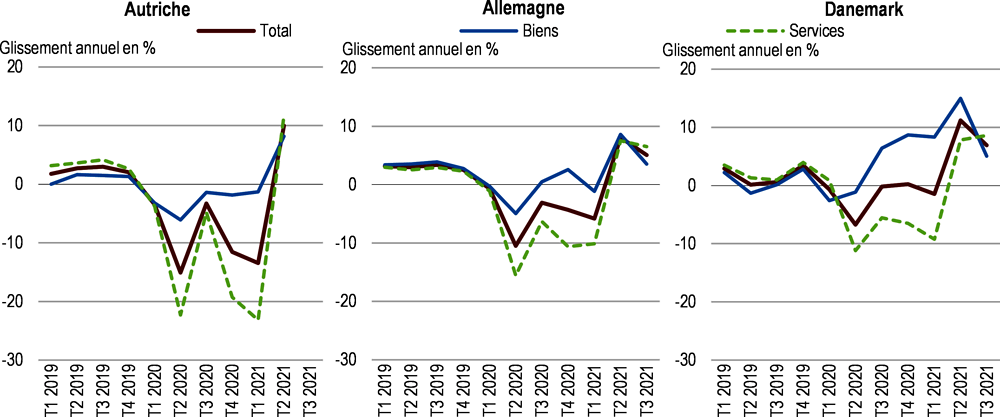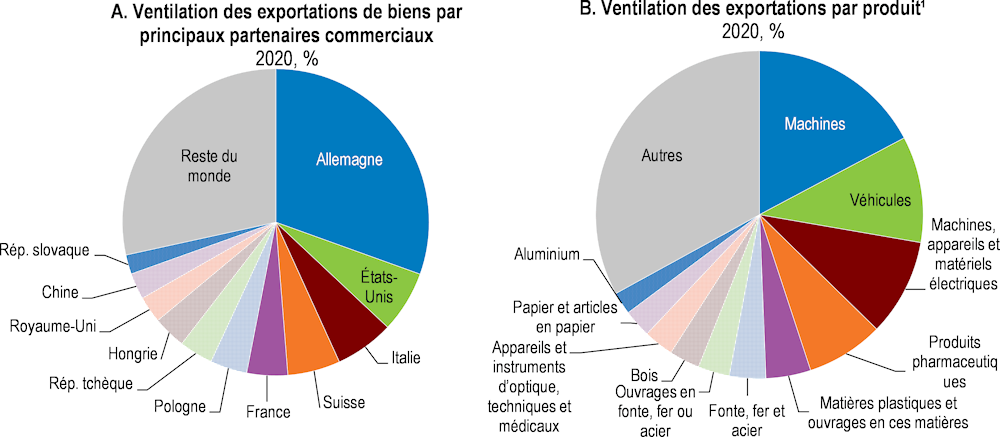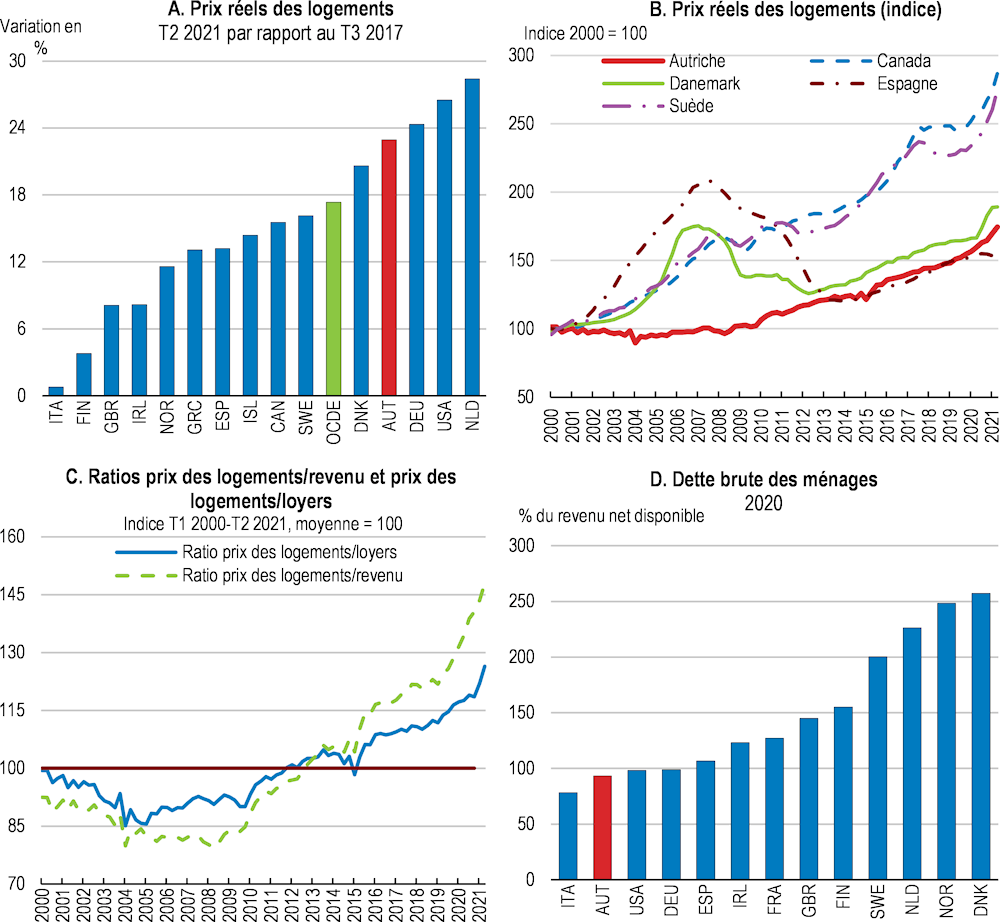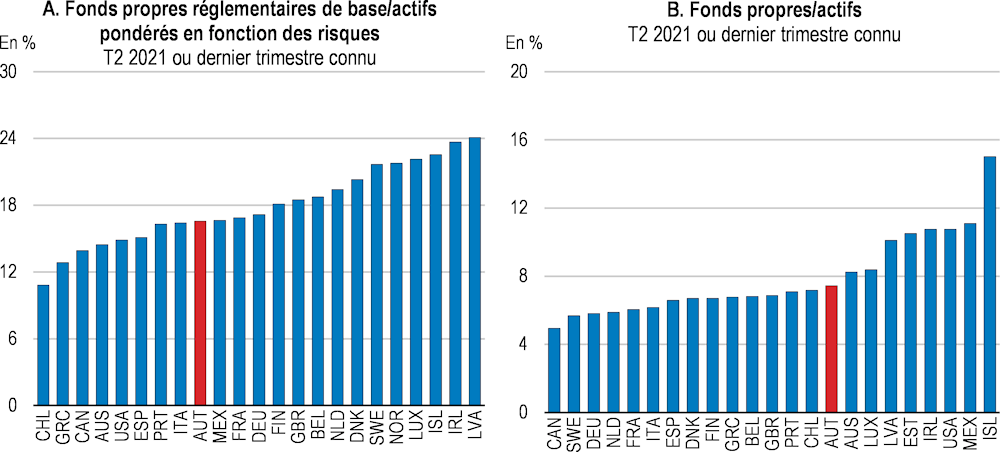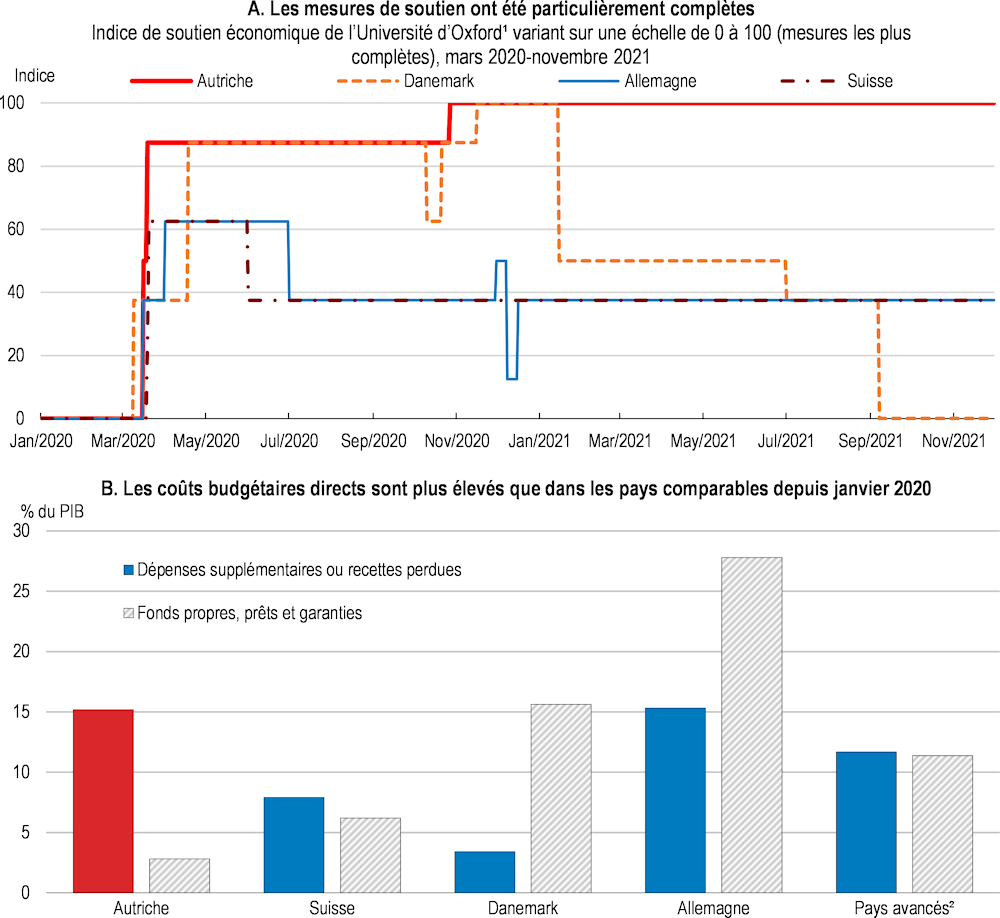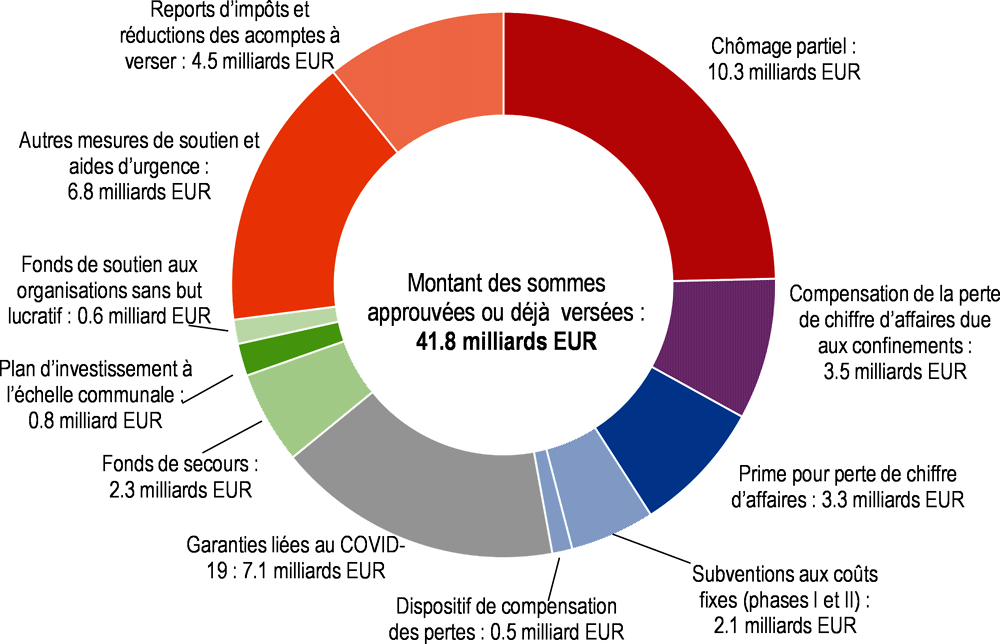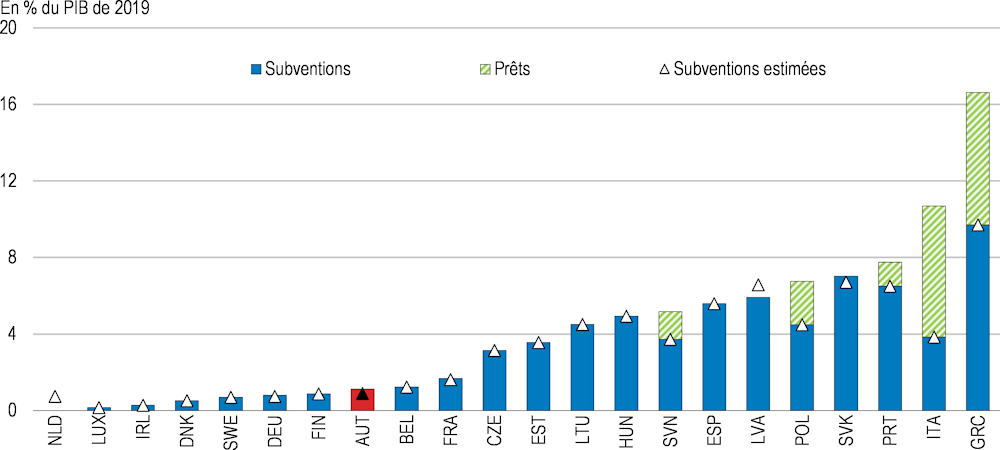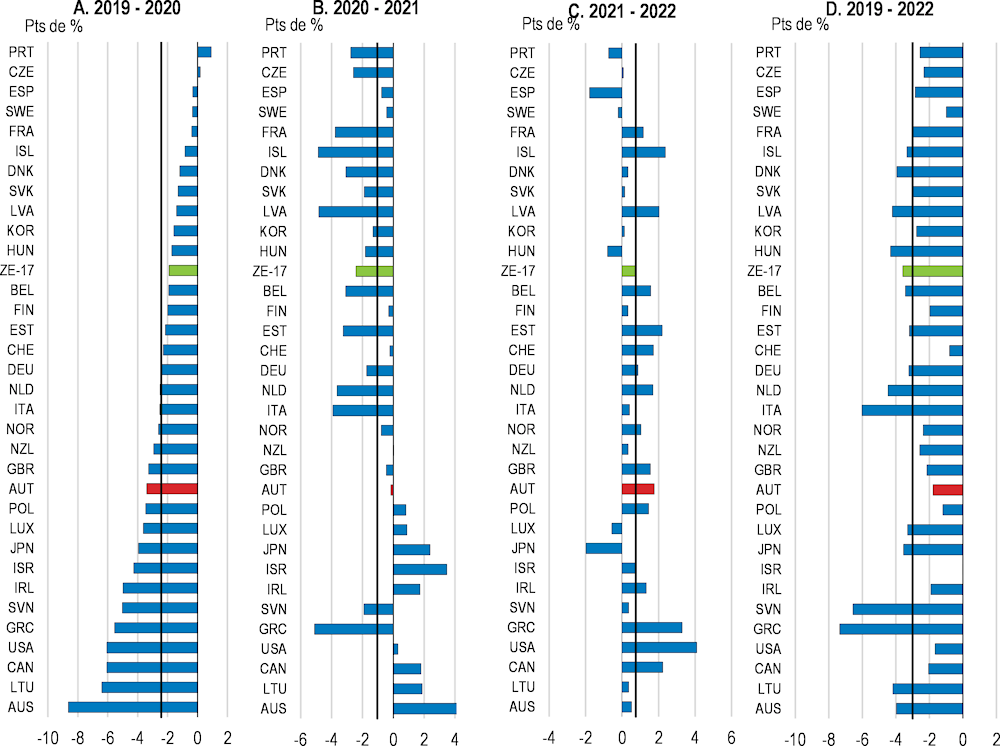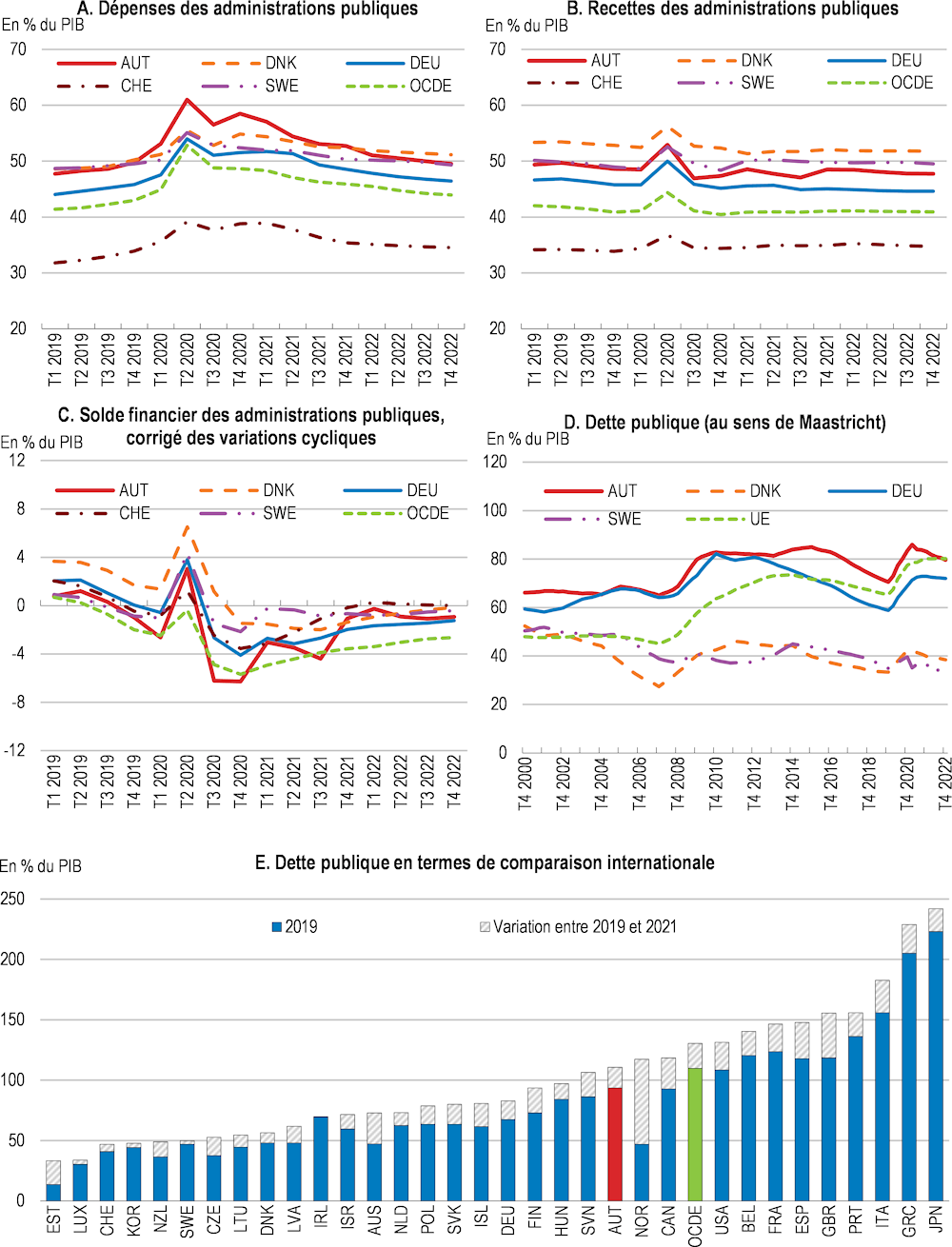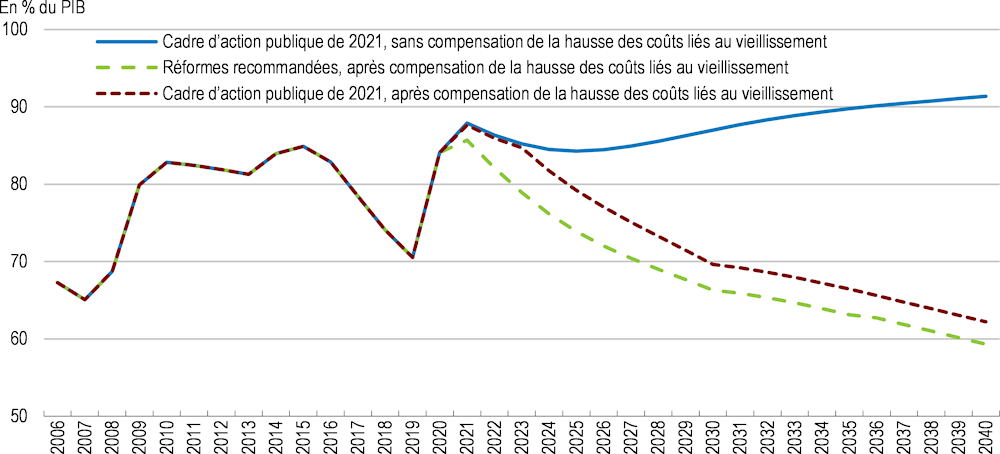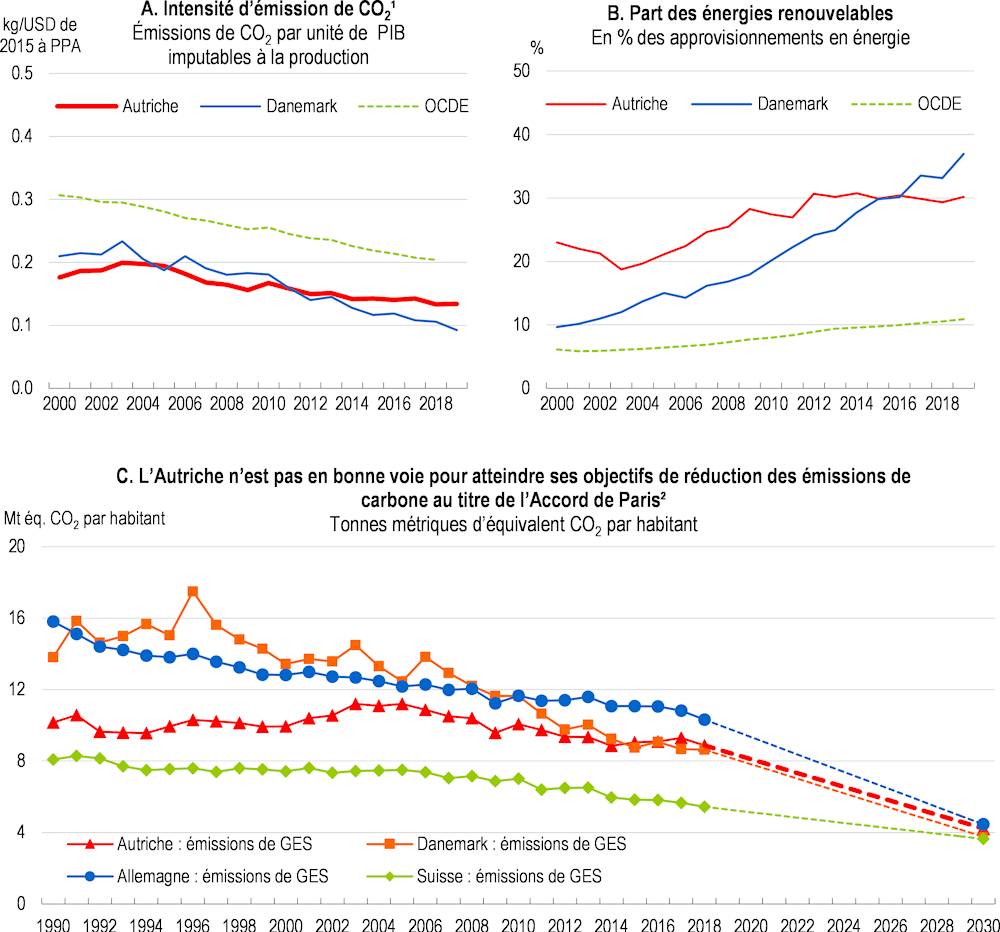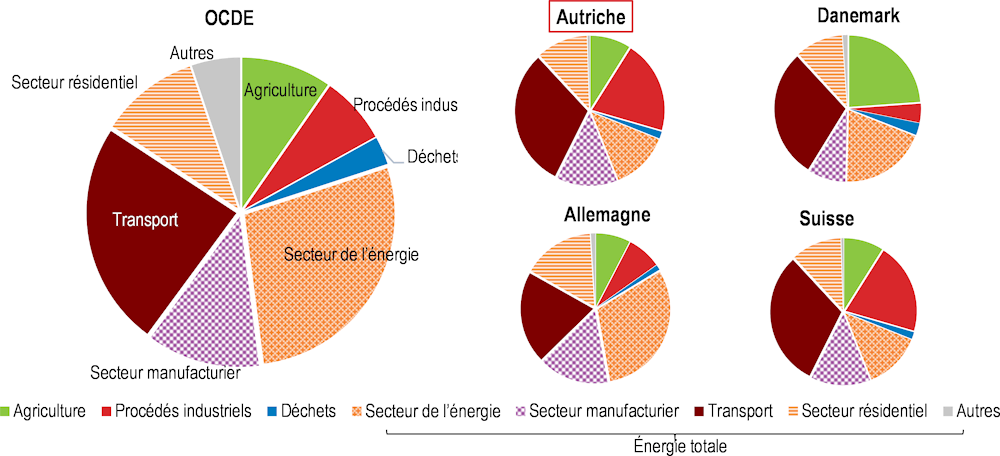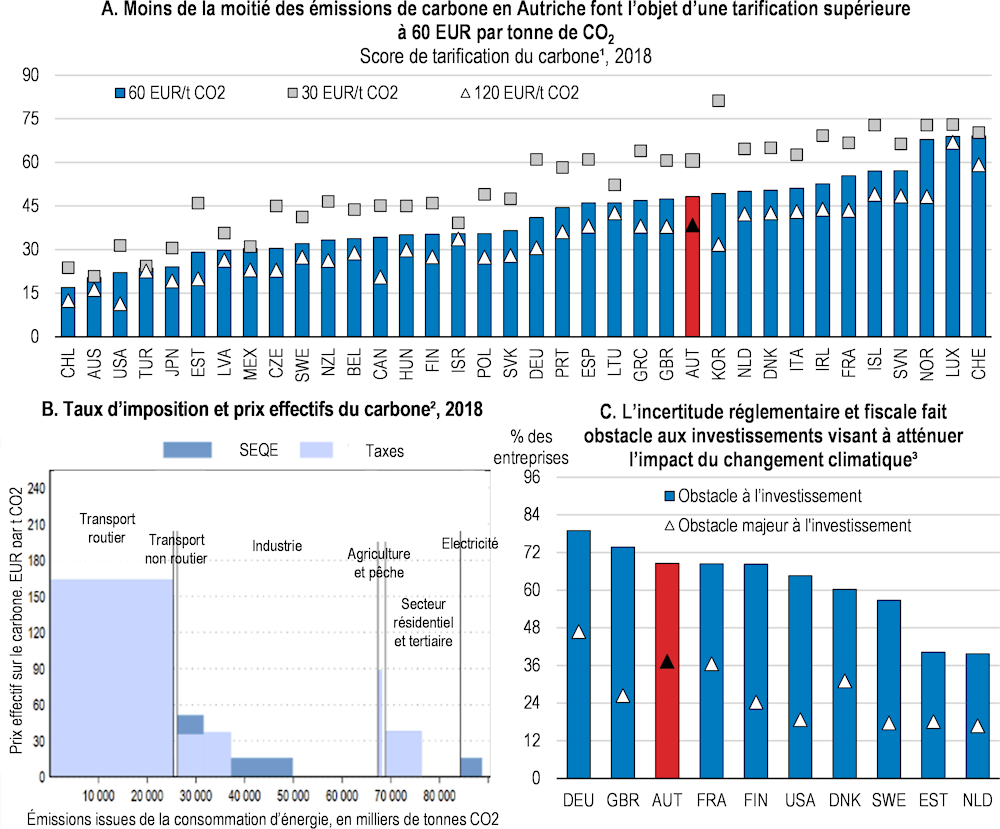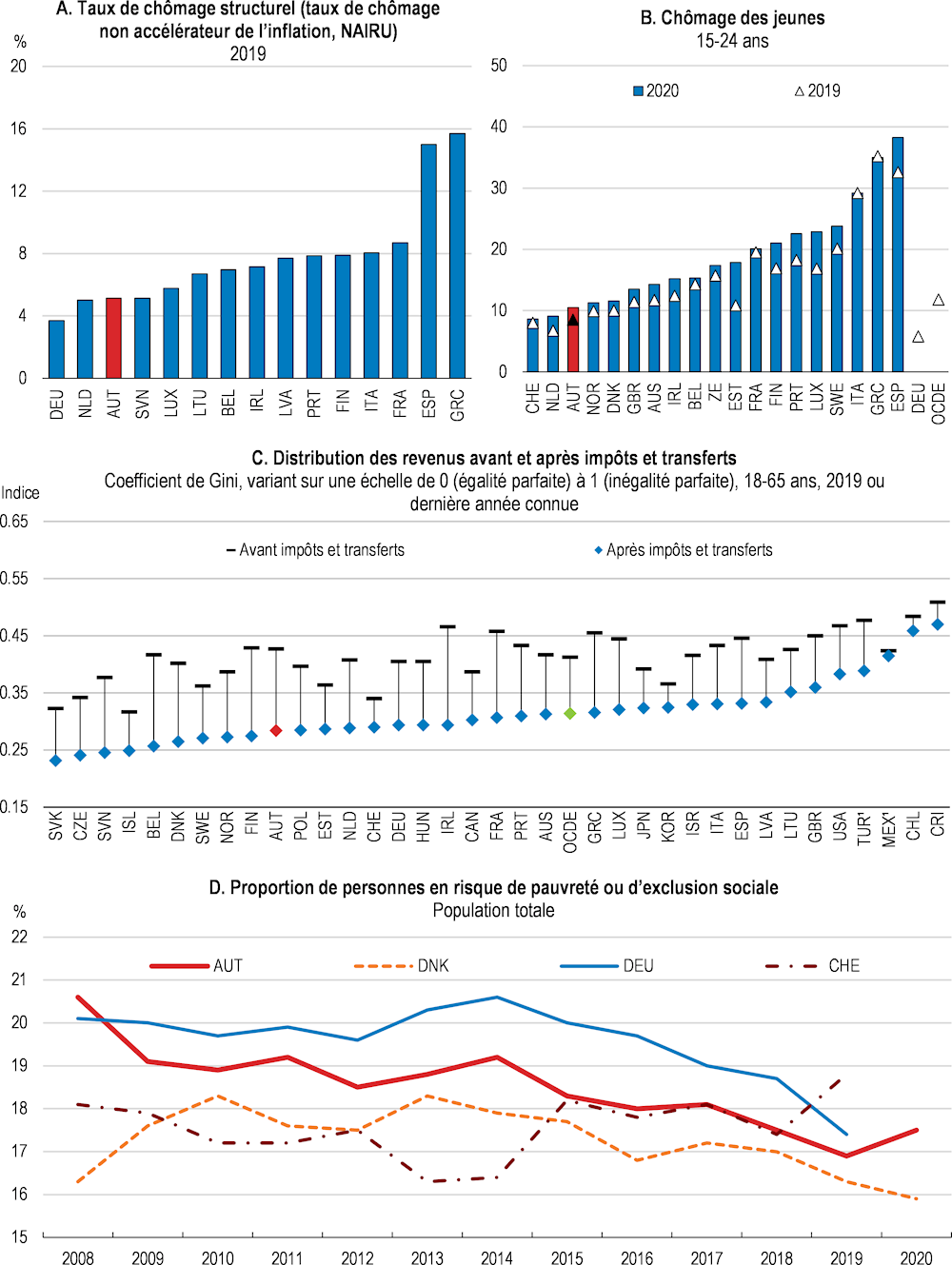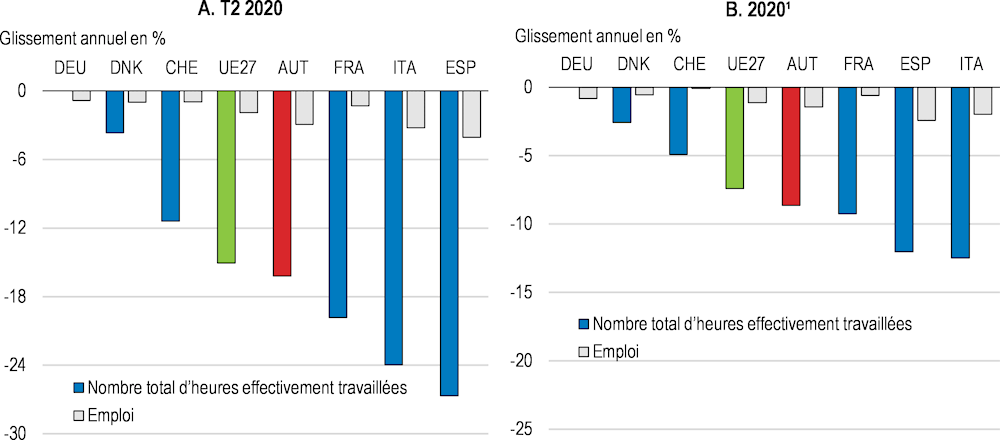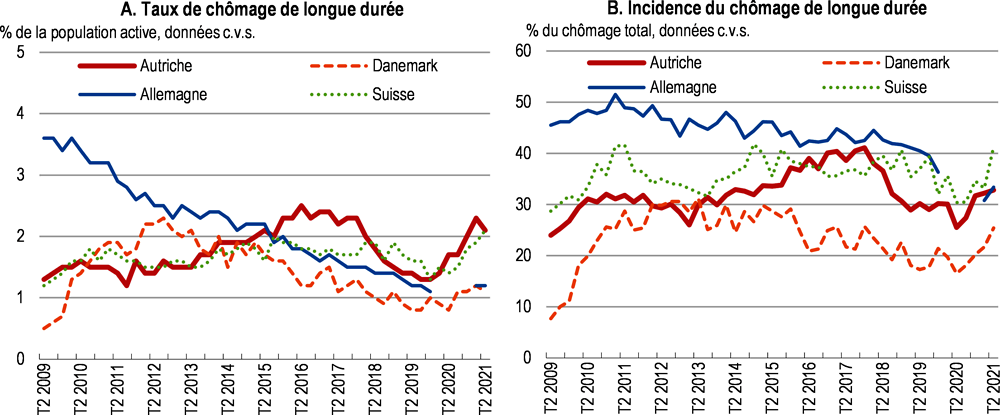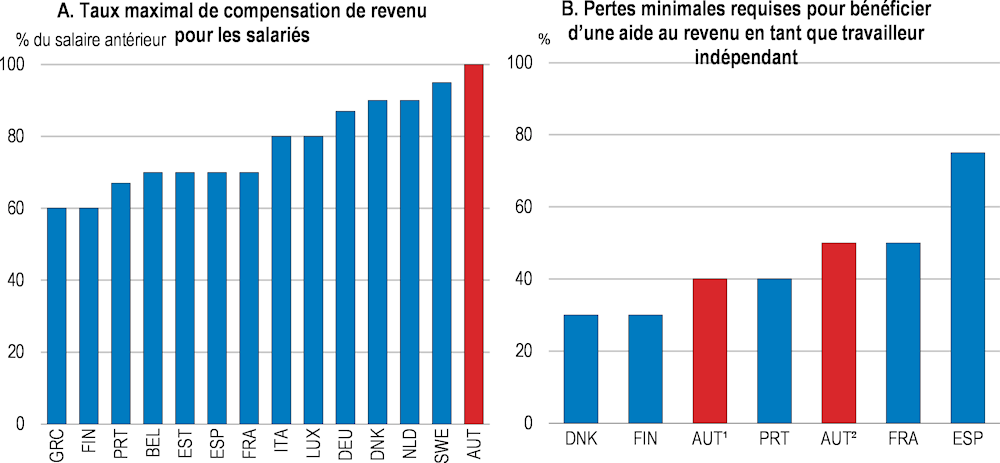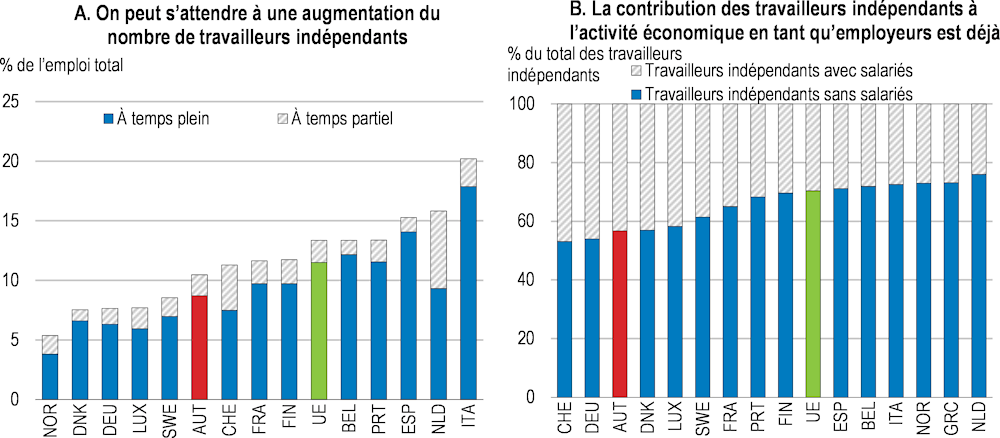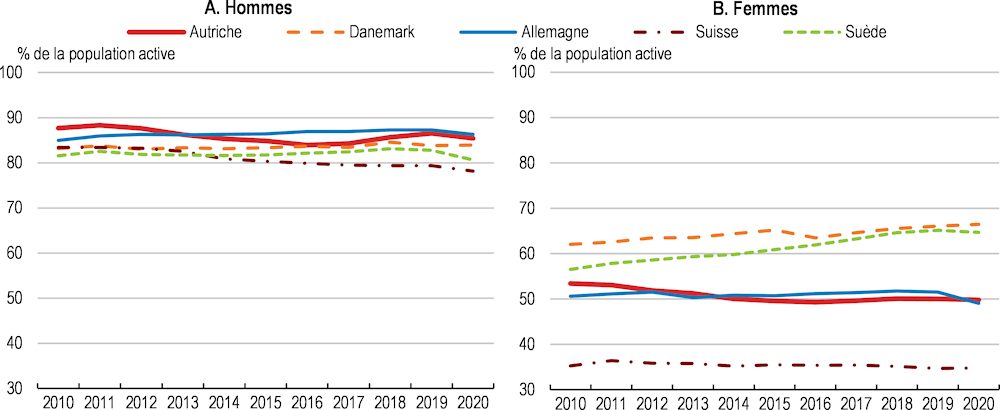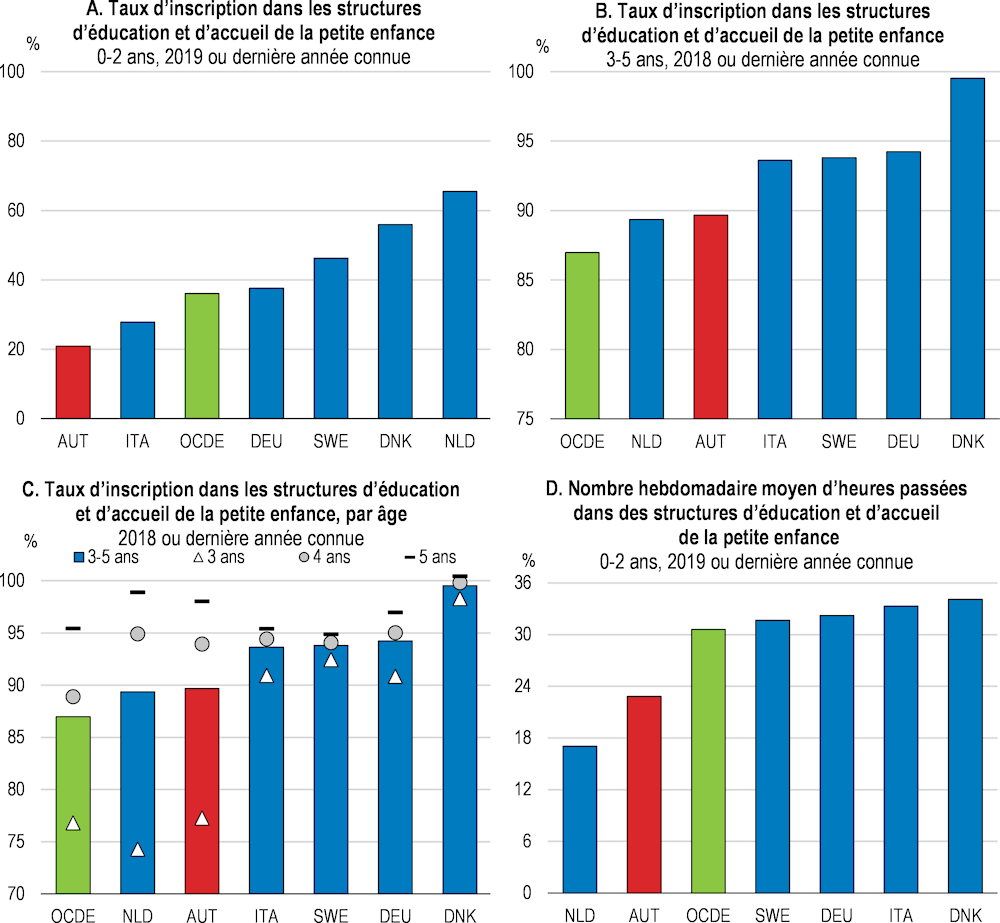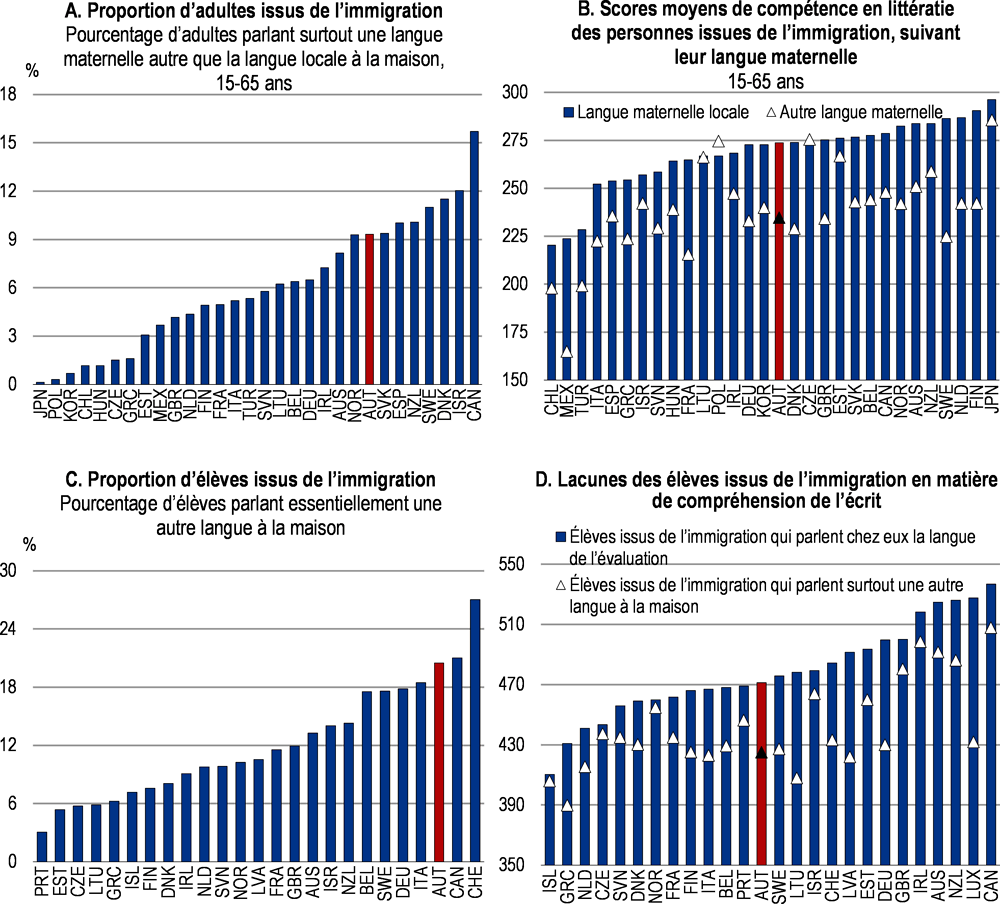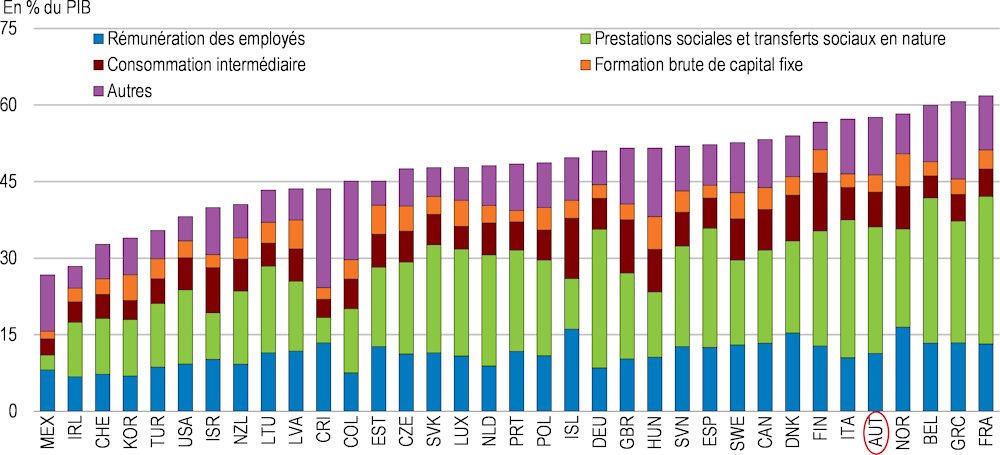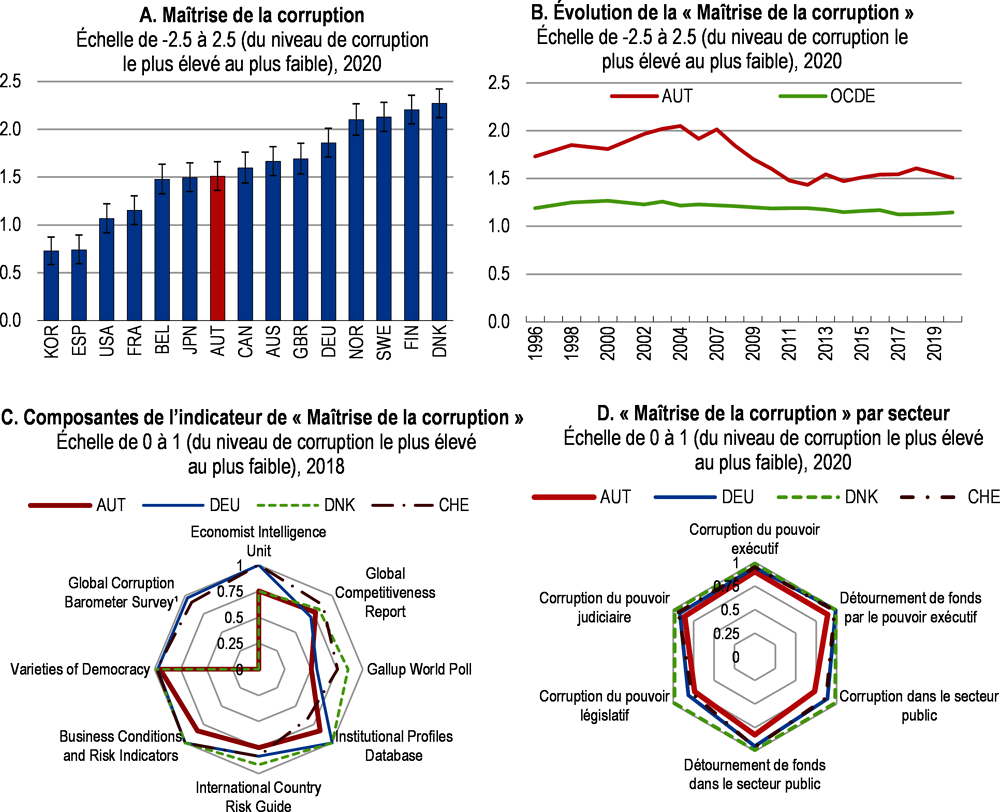Artner, S. (2017), Real Estate Trends and Foreign Investments in Austria, Expert Guides.
Ashworth, M. (2020), A 100-Year Bond at Less Than 1%? It´s No Big Deal, Bloomberg Opinion.
Atos (2020), “COVID-19: Atos and the City of Vienna implement system for digital epidemic management”, Vienna.
Austrian Hotelier Association (2021), “Increasing equity”, mimeo, Vienna.
Bachner F, J. Bobek, K. Habimana, J. Ladurner, J. Lepuschutz, H. Ostermann, L. Rainer, A. Schmidt, M. Zuba, W. Quentin, J. Winkelmann J. (2018), “Austria: Health System Review”, Health Systems in Transition, European Observatory on Health Systems and Policies.
Bargain, O., U. Aminjonov (2020), “Trust and compliance to public health policies in times of COVID-19”, Journal of Public Economics.
Beer Ch., F. Rumler, J. Tölgyes and E.Wieland (2020), “Prices and inflation in Austria during the COVID-19 crisis - an analysis based on online price data”, Monetary Policy and the Economy, Oesterreichische Nationalbank, Q4/20-Q1/21.
Bock- Schappelwein, J., U. Famira-Muhlberger, C. Mayrhuber (2020), “COVID-19: Okonomische Effekte auf Frauen”, WIFO Research Briefs, 3/2020.
Bock-Schappelwein, J., U. Huemer and W. Hyll (2021), Beschaftigung 2020: Bilanz nach einem Jahr COVID-19-Pandemie, WIFO Research Briefs, 1/2021.
Bock-Schappelwein, J., Eppel, R., Huemer, U., Hyll, W., Mahringer, H. (2020), COVID-19-Pandemie: Rückgang der Beschäftigung und Anstieg der Arbeitslosigkeit halten im April an, WIFO Research Briefs 5/2020, Vienna.
Bodomo Y., E. Kormann, S. Lagoun, I. Fialka (2021), “COVID-19: Opportunity for Health Care in Austria”, Health Hub Vienna.
Boheim, R. and T. Leoni (2020), IZA COVID-19 Crisis Response Monitoring: Austria, IZA Institute of Labor Economics.
Boheim, R. and M. Christl (2021), Mismatch Unemployment in Austria: The Role of Regional Labour Markets for Skills, IZA Discussion Paper Series, No. 14361.
Buckle S., J. Ellis, A. Aguilar Jaber, M. Rocha, B. Anderson and Petter Bjersér (2020), "Addressing the COVID-19 and climate crises: Potential economic recovery pathways and their implications for climate change mitigation, NDCs and broader socio-economic goals", OECD/IEA Climate Change Expert Group Papers, No. 2020/04, OECD Publishing, Paris.
Card, D., J. Kluve and A. Weber (2018), “What Works? A Meta Analysis of Recent Active Labor Market Program Evaluations”, Journal of the European Economic Association, Vol. 16/3, pp. 894-931.
Christl, M., S. De Poli, D. Kucsera and H. Lorenz (2021), “COVID-19 and (gender) inequality in income: the impact of discretionary policy measures in Austria”, JRC Technical Report, No. 05/2021.
CMS (2021), Digital Health Apps and Telemedicine in Austria, CMS Expert Guides.
Cook I. (2021), Who is Driving the Great Resignation, Harvard Business Review, September.
Cournede, B., J.M. Fournier and P. Hoeller (2018), “Public Finance Structure and Inclusive Growth”, OECD Economic Policy Paper, No.25, OECD Publishing, Paris.
Czypionka, T., M. Reiss (2021), “Three Approaches to Handling the COVID-19 Crisis in Federal Countries: Germany, Austria and Switzerland”, In S.L. Greer, E.J. King, E.M. Fonseca and A. Peralta-Santos (Eds.), Coronavirus Politics: The Comparative Politics and Policy of COVID-19, PART III, pp. 295-320, University of Michigan Press.
De Smet A., B. Dowling, M. Mugayar-Baldocchi and B. Schaninger (2021), “Great Attrition or Great Attraction? The choice is yours”, McKinsey Quarterly, September.
Deutsche Welle (2021), “Coronavirus digest: Austria warns of lockdown for unvaccinated”, 23 October.
Eurofound (2021), COVID-19: Implications for employment and working life, Research Report, Publications Office of the European Union, Luxembourg.
European Commission (2021a), “Analysis of the recovery and resilience plan for Austria”, Commission Staff Working Document, Brussels.
European Commission (2021b), “Recommendation for a Council Recommendation delivering a Council opinion on the 2021 Stability Programme of Austria ”, Brussels.
European Commission (2021c), “The 2021 Ageing Report: Economic and Budgetary Projections for the EU Member States (2019-2070)”, Institutional Paper 148.
European Commission (2014), Guide to Cost-Benefit Analysis of Investment Projects”, Brussels.
Famira-Mühlberger U. and M. Firgo (2019), "Zum künftigen Bedarf an Pflegepersonal in den stationären und mobilen Diensten (On the Future Need for Caregivers in Inpatient and Mobile Services), WIFO-Monatsberichte No.3, (Link).
Federaal Kenniscentrum voor de Gezondheidszorg (2019), International Comparison of Health Literacy Policies and Options for a Policy Plan for Belgium.
Federal Ministry of Digital and Economic Affairs (2018), The New Foreign Trade Strategy – An Innovative Foreign Trade Policy for a Successful Austria.
Federal Ministry of Finance (2021), Austrian Stability Programme (Update for the period 2020 to 2024).
Fidora M., F. Pastoris and M. Schmitz (2021), “Developments in the euro area current account during the pandemic”, ECB Economic Bulletin, Issue 4.
Financial Market Stability Board (2021), 28th meeting of the Financial Market Stability Board, 18 June.
Financial Times (2021a), “Austrian banks bolster Vienna’s financial hub ambitions”, 1 September.
Financial Times (2021b), “Vienna’s banking industry struggles to shake off dirty money scandals”, 1 September.
Firgo M. and U. Famira-Mühlberger (2020), “Öffentliche Ausgaben für Pflege nach Abschaffung des Regresses in der stationären Langzeitpflege (Public expenditure for care after the abolition of recourse in in-patient long-term care)”, WIFO-Monatsberichte No.6.
Frauenhofer Austria (2021), E-Mobility and the Austrian Production Potential, Project Report, Vienna.
Friesenbichler K., W. Hölzl, A. Köppl, B. Meyer (2021), “Investitionen in die Digitalisierung und Dekarbonisierung in Österreich.Treiber, Hemmnisse und wirtschaftspolitische Hebel (Investments in Digitalisation and Decarbonisation in Austria. Drivers, Barriers and Economic Policy Levers)”, WIFO, Vienna, June.
Gesundheit Ziele (2021), “Bedarfs‐ und Angebotsanalyse für die Weiterentwicklung der Österreichischen Plattform Gesundheitskompetenz (ÖPGK).
Hofmarcher, M. (2020), “Austria’s Response to the Coronvirus” Cambridge Core Blog.
Hofmarcher, M and Ch. Singhuber (2021), “Föderalismus im Gesundheitswesen: Schwächen des COVID-19 Krisenmanagements (Federalism in Health Care: Weaknesses in COVID-19 Crisis Management)”, Austrian Health Academy Policy Brief.
Holtgrewe, U., B. Schober, M. Steiner (2021), “Schule unter COVID 19 Bedingungen: Erste Analysen und Empfehlungen”, COVID 19 Future Operations.
Health Hub Vienna (2021),“COVID-19: An Opportunity for Health Care in Austria“.
Hyee R., H. Immervoll, R. Fernandez and J. Lee ((2020), "How reliable are social safety nets?: Value and accessibility in situations of acute economic need", OECD Social, Employment and Migration Working Papers, No. 252, OECD Publishing, Paris.
ICON Institute (2016), Assessment Report on Public Employment Service Capacity, European Commission.
International Energy Agency (2020), Austria 2020: Energy Policy Review, IEA Publications.
International Energy Agency (2021), Net Zero by 2050 - A Roadmap for the Global Energy Sector, IEA Publications.
Jahoda M., P. Lazarsfeld and H. Zeisel (1931), Marienthal: The Sociography of an Unemployed Community, Routledge, London.
Jaimovich, N. and H.E. Siu (2018), “Job Polarization and Jobless Recoveries”, NBER Working Paper Series, No. 18334.
Kasy, M. and L. Lehner (2021), “Employing the unemployed of Marienthal: Evaluation of a guaranteed job program”, AEA RCT Registry.
Keil, A.K. (2021), “Just transition strategies for the Austrian and German automotive industry in the course of vehicle electrification”, Working Paper, Chamber of Labour,Vienna.
Khalil S. (2020),”Telemedicine on the rise in Austria?”, Schönherr Rechtsänvelte, Vienna.
Kittel, B., S. Kritzinger, H. Boomgaarden, B. Prainsack, J.M. Eberl, F. Kalleitner, N.S. Lebernegg, J. Partheymuller, C. Plescia, D.W. Schiestl and L. Schlogl (2020), “The Austrian Corona Panel Project: monitoring individual and societal dynamics amidst the COVID-19 crisis”, European Political Science, pp. 1-27.
Kleven H., C. Landais, J. Posch, A. Steinhauer, J. Zweimüller (2021), “Do Family Policies Reduce Gender Inequality?”, Evidence from 60 Years of Policy Experimentation”, NBER Working Paper No. 28082, January.
Kocher M. and M. Steiner (2020), “Kosten von Schulschließungen zur Pandemiebekämpfung” (Costs of school closures in fighting the pandemic). IHS Policy Brief 20, November.
Korlat, S. (2021), Learning under COVID-19: Challenges for self-regulation, WELSfocus, University of Vienna.
Kowarz, N. and M. Pollak (2020), “Who trusts the state? Institutional trust in times of Corona”, Vienna Center for Electoral Research, Univesity of Vienna.
Ljungman G. (2008), “Expenditure Ceilings – A Survey”, IMF Working Paper, Washington D.C.
Manescu C. and E. Bova (2020), “National Expenditure Rules in the EU: An Analysis of Effectiveness and Compliance”, Discussion paper no. 124, European Economy, April.
McKinsey and Co. (2021a), Computers on wheels, March.
McKinsey and Co. (2021b), ‘Great Attrition’ or ‘Great Attraction’? The choice is yours, September.
Midgley, E. (2021), What is Austria´s new five-colour COVID traffic light system?, The Local.
Ministry of Health (2018), “Gesundheitskompetenz Der Bevölkerung Stärken (To Enhance the Health Literacy of the Population)”, Vienna.
Moreira L. (2018), “Health Literacy for People-Centred Care: Where do OECD countries stand?”, OECD Health Working Paper No. 107, Paris.
Neck, R., G. Haber and A. Klinglmair (2015), “Austrian Public Debt Growth: A Public Choice Perspective”, Internationa Advances in Economic Research, Vol. 21, No.3.
Nusche, D., T. Radinger, M.R. Busemeyer and H. Theisens (2016), OECD Reviews of School Resources: Austria 2016, OECD Publishig, Paris.
Oderkirk, J. (2021), “Survey Results: National Health Data Infrastructure and Governance”OECD Health Working Paper No. 127.
OECD (2012), Closing the Gender Gap: Act Now, OECD Publishing, Paris.
OECD (2015), Economic Surveys: Austria 2015, OECD Publishing, Paris.
OECD (2015a), Indicators of Immigrant Integration 2015, OECD Publishing, Paris.
OECD (2016), “Nuclear Legislation in OECD and NEA Countries: Austria”.
OECD (2017a), Economic Surveys: Austria 2017, OECD Publishing, Paris.
OECD (2017b), Making Integration Work: Family Migrants, OECD Publishing, Paris.
OECD (2017c), Education Policy Outlook Austria, OECD Publishing, Paris.
OECD (2018a), How Does Austria Compare?, OECD Jobs Strategy.
OECD (2018b), Settling in 2018: Indicators of Immigrant Integration, OECD Publishing, Paris.
OECD (2019), Economic Surveys: Austria 2019, OECD Publishing, Paris.
OECD (2019b), Accelerating Climate Action: Refocusing Policies through a Well-being Lens, OECD Publishing, Paris.
OECD (2019c), Recommendation of the Council on Health Data Governance, OECD Publishing, Paris.
OECD (2020a), “Skills in Transition”: Highlights from the OECD Forum Virtual Roundtable, The OECD Forum Network.
OECD (2020b), OECD Policy Responses to Coronavirus (COVID-19): Distributional risks associated with non-standard work: Stylised facts and policy considerations.
OECD (2020c), OECD Indicators of Employment Protection (2019 indicators published in 2020).
OECD (2020d), “Social Housing: A Key Part of Past and Future Housing Policy”, Employment, Labour and Social Affairs Policy Brief.
OECD (2020e), OECD Policy Responses to Coronavirus (COVID-19): What is the impact of the COVID-19 pandemic on immigrants and their children?.
OECD (2021a), No Ordinary Recovery: Navigating the Transition, Economic Outlook, May 2021.
OECD (2021b), Brick by Brick: Building Better House Policies, OECD Publishing, Paris.
OECD (2021c), OECD Skills Outlook 2021: Learning for Life, OECD Publishing, Paris.
OECD (2021d), OECD Employment Outlook 2021: Navigating the COVID-19 Crisis and Recovery, OECD Publishing, Paris.
OECD (2021e), Employment, Skills and Work, Adult Learning.
OECD (2021f), The Impact of COVID-19 on Social and Welfare Issues.
OECD (2021g), Active Labour Market Policy Measures to Mitigate the Rise in Unemployment: A Summary of Country Responses to the OECD-EC Questionnaire.
OECD (2021h), OECD Policy Responses to Coronavirus (COVID-19): Scaling up policies that connect people with jobs in the recovery from COVID-19.
OECD (2021i), OECD Affordable Housing Database.
OECD (2021j), “Effective Carbon Rates 2021 - Pricing Carbon Emissions through Taxes and Emissions Trading”, OECD Publishing, Paris.
OECD EPC Working Party No. 1 (2021), “Decarbonisation primer: Designing and monitoring strategies to achieve climate change targets while boosting growth and social cohesion”, ECO/CPE/WP1(2021)21.
OeNB (2021), “Internationale Lieferschwierigkeiten kosten Österreichs Wirtschaft bisher eine drei viertel Milliarde Euro“, September.
OGM Research Communication (2021), APA/OGM-Analyse: Kleingemeinden 2020 starker gewachsen als Stadte.
ONB (2021), Financial Stability Report 41.
Pichler, P., Schmidt-Dengler, P., Zulehner, C. (2020), “Von Kurzarbeit und Kündigungen sind sozial schwächere Personen am meisten betroffen”, Vienna University Corona Blog.
Pollak, M., N. Kowarz and J. Partheymuller (2020), “Chronology of the Corona Crisis in Austria - Part 2: From the first easing of measures towards restoring normality”, Vienna Center for Electoral Research, University of Vienna.
Pollak, M., N. Kowarz and J. Partheymuller (2020), “Chronology of the Corona Crisis in Austria: A calm summer and the beginning of the second wave”, Vienna Center for Electoral Research, University of Vienna.
Reinstaller, A. and K.S. Friesenbichler (2020), Better Exports Technologie, Federal Ministry Republic of Austria Digital and Economc Affairs, FIW-Research Reports.
Rodriguez-Pose, C. Burlina (2021), “Institutions and the uneven geography of the first wave of the COVID-19 pandemic”, Journal of Regional Science.
Schober B., M. Lüftenegger and Ch. Spiel (2021), “Lernen unter COVID-19 Bedingungen” (Learning under COVID-19 conditions), University of Vienna.
Stephany, F. and H. Lorenz (2021), “The Future of Employment Revisited: How Model Selection Determines Automation Forecasts”.
Strack R., O. Kovács-Ondrejkovic, J. Baier, P. Antebi, K. Kavanagh, and A. López Gobernado (2021), “Decoding Global Reskilling and Career Paths”, Study by Boston Consulting Group.
Streicher G., Cl. Kettner-Marx, M. Peneder, F. Gabelberger (2020), “Landkarte der “De- Karbonisierung“ für den produzierenden Bereich in Österreich - De-carbonisation Map for the Austrian Manufacturing Sector”, WIFO and Chamber of Labour, Vienna, November.
Unbehaun W., T. Uhlmann, R. Hössinger, F. Leisch and R. Gerike (2014), “Women and Men With Care Responsibilities in the Austrian Alps: Activity and Mobility Patterns of a Diverse Group“, Mountain Research and Development, Vol. 34, No. 3.
Waibel, M., D.W. Schiestl, F. Kalleitner (2020), “Waren die Maßnahmen ein Fehler? Die Mehrheit der österreichischen Bevölkerung sieht das nicht so”, Vienna Center for Electoral Research, University of Vienna.
WHO (2020), COVID-19 Health System Response Monitor, Policy Responses for Austria.
WIFO (2018), Unemployment Remains High, Austrian Institute of Economic Research.
Winter-Ebmer, R. (2001), “Evaluating an Innovative Redundancy-Retraining Project: The Austrian Steel Foundation”, IZA Discussion Paper, No. 277.
Worldbank (2021), Worldwide Governance Indicators.
Yonhap News Agency (2021), S.Korea, Austria agree to forge ´strategic partnership´.
Zimmermann, B.M., A. Fiske, B. Prainsack, N. Hangel, S. McLennan and A. Buyx (2020), “The Conceptualization ,of COVID-19 Contact Tracing Apps in German-speaking Countries in April 2020: A Comparative Mixed Methods Study”, Submitted to: Journal of Medical Internet Research.

